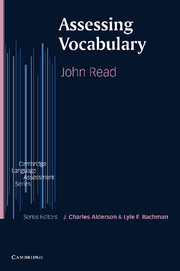Book contents
- Frontmatter
- Contents
- Series editors' preface
- Acknowledgements
- 1 The place of vocabulary in language assessment
- 2 The nature of vocabulary
- 3 Research on vocabulary acquisition and use
- 4 Research on vocabulary assessment
- 5 Vocabulary tests: four case studies
- 6 The design of discrete vocabulary tests
- 7 Comprehensive measures of vocabulary
- 8 Further developments in vocabulary assessment
- References
- Index
5 - Vocabulary tests: four case studies
Published online by Cambridge University Press: 03 May 2010
- Frontmatter
- Contents
- Series editors' preface
- Acknowledgements
- 1 The place of vocabulary in language assessment
- 2 The nature of vocabulary
- 3 Research on vocabulary acquisition and use
- 4 Research on vocabulary assessment
- 5 Vocabulary tests: four case studies
- 6 The design of discrete vocabulary tests
- 7 Comprehensive measures of vocabulary
- 8 Further developments in vocabulary assessment
- References
- Index
Summary
Introduction
In this chapter I discuss four tests that assess vocabulary knowledge as case studies of test design and validation. I have referred to all four of them in earlier chapters, especially Chapter 4, and so the case studies give me the opportunity to explore issues raised earlier in greater depth, in relation to particular well-known language tests.
The four tests are:
The Voluntary Levels Test;
The Eurocentres Vocabulary Size Test (EVST);
The Vocabulary Knowledge Scale (VKS); and
The Test of English as a Foreign Language (TOEFL)
These tests do not represent the full range of measures covered by the three dimensions of vocabulary assessment which I presented in Chapter 1. Three of them are discrete, context-independent tests and all four are selective rather than comprehensive. However, I have chosen them because they are widely known and reasonably well documented in the literature. More specifically, there is research evidence available concerning their validity as assessment procedures for their intended purpose. They also represent innovations in vocabulary assessment and serve to highlight interesting issues in test design. However, there is a limited number of instruments that I could have considered for inclusion as case studies in this chapter, which reflects the fact that, despite the upsurge in second language vocabulary studies since the early 1980s, the design of tests that could function as standard instruments for research or other assessment purposes has been a neglected area.
- Type
- Chapter
- Information
- Assessing Vocabulary , pp. 117 - 149Publisher: Cambridge University PressPrint publication year: 2000



